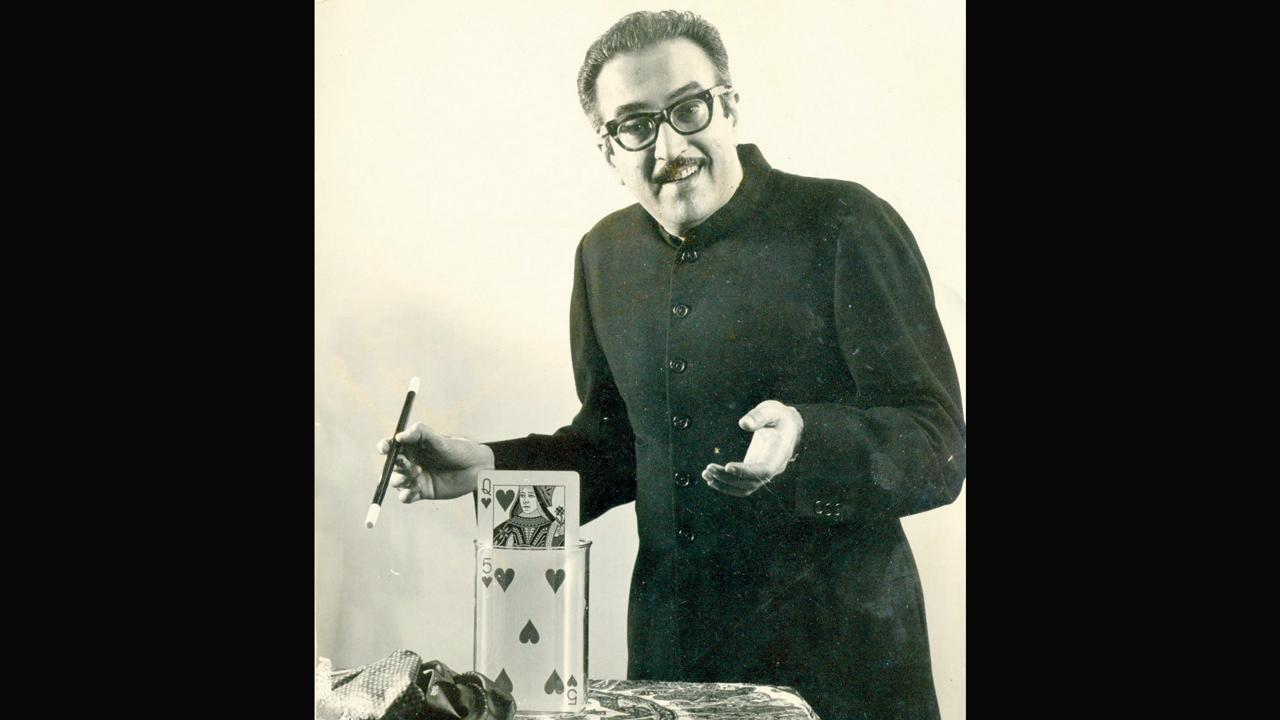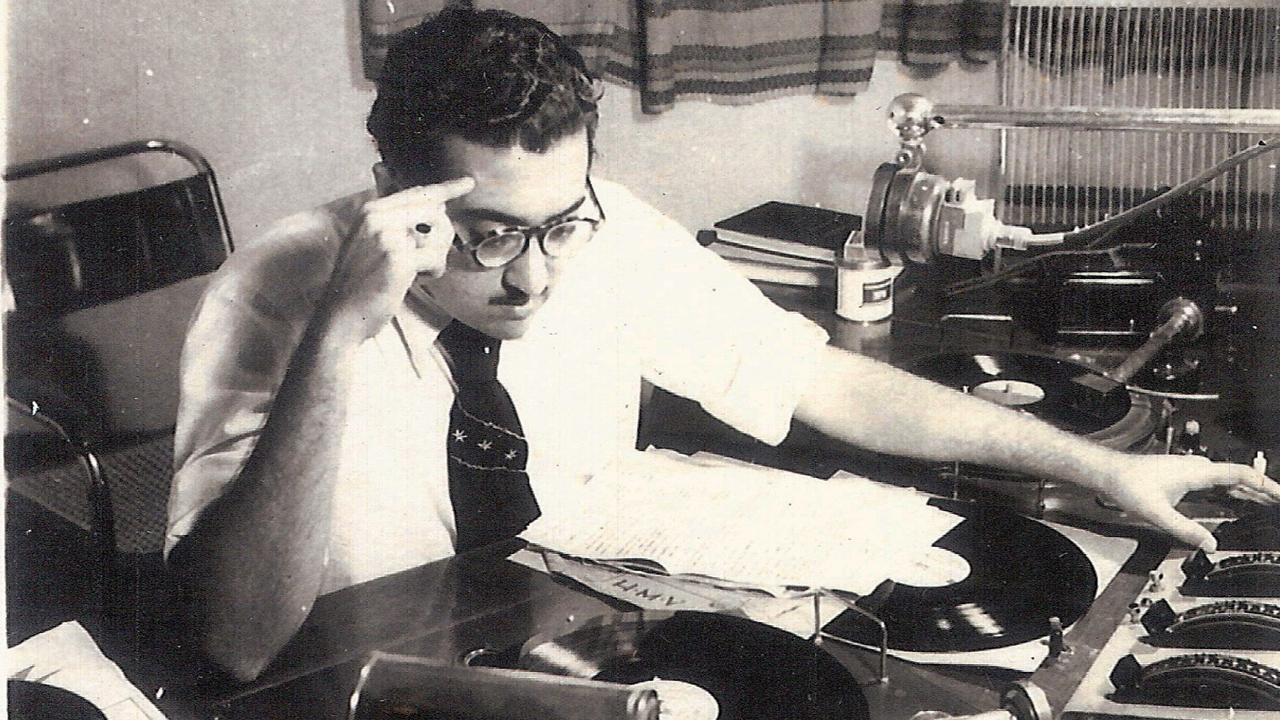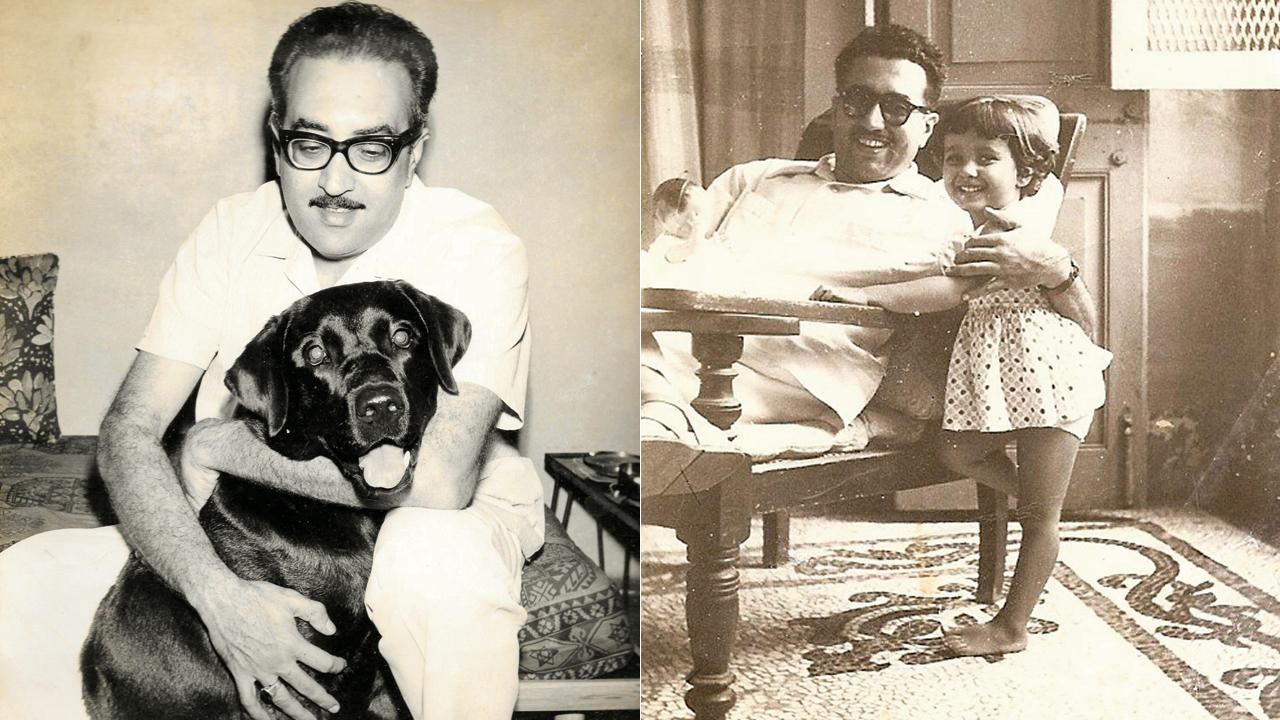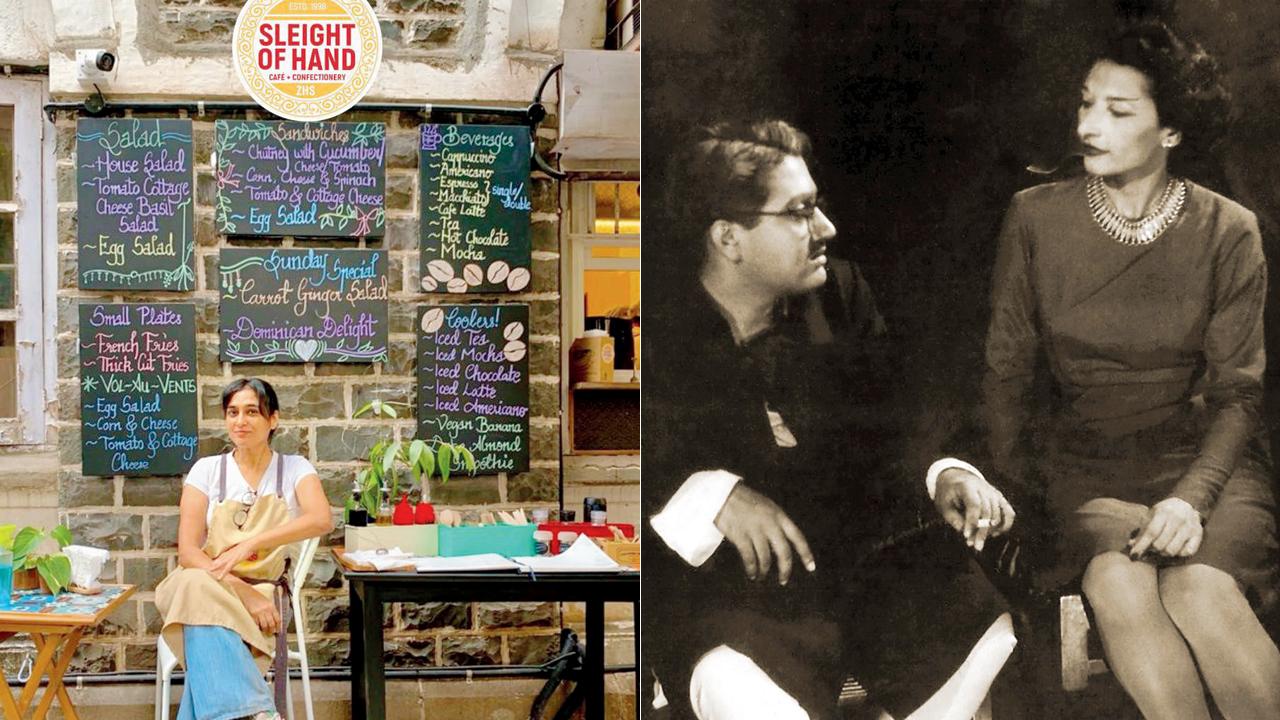Veteran radio presenter, actor, master of ceremonies and magician, the late Hamid Sayani wore several hats with accomplished ease. He would have been 95 this week

Hamid Sayani. Pics courtesy/Rajil Sayani
 Hamid Sayani is alive. He lives through electronic sounds he helped pioneer. Hamid is alive. He survives in film forms he fashioned for our screens. Ham is alive. He endures in the minds and hearts of friends beyond count.”
Hamid Sayani is alive. He lives through electronic sounds he helped pioneer. Hamid is alive. He survives in film forms he fashioned for our screens. Ham is alive. He endures in the minds and hearts of friends beyond count.”
ADVERTISEMENT
So wrote Sylvester daCunha in one of the moving obits heaped on Sayani (1926-1975). He titled it “Hello out there!”—his affable friend’s standard salutation thrilling thousands of fans.
I write with the background charm of crescendo notes of the Bournvita Quiz Contest jingle soaring in a loop. Participant teams fumbling for answers, the inimitable quizmaster would observe, “They are completely foxed by this,” as the clock solemnly ticked precious seconds.
 Hamid Sayani the broadcaster and the illusionist. Pic Courtesy/Rajil Sayani
Hamid Sayani the broadcaster and the illusionist. Pic Courtesy/Rajil Sayani
Legions of admirers were devastated by the too-early death, by heart attack, at merely age 48, of their beloved broadcaster.
Make that broadcaster, radio writer-producer, theatre actor, documentary filmmaker and master of ceremonies. As if not multi-mirrored enough, Sayani was an illusionist extraordinaire, a member of the US-based International Brotherhood of Magicians and, till 1971, possibly the sole Indian admitted to the prestigious Inner Magic Circle of the World. To demonstrate magic for a live audience is already ingenious. Sayani managed guiding listeners in their homes to flick-flash card packs with panache. Coaxing, compelling, he teased the trickery out of them with softly encouraging instructions.
Fleeing Junior BSc classes at the Royal Institute of Science, Sayani began his AIR career in 1945. Alongside a gamut of sparkling scripts and topical talks were insightful conversations with city personalities for his show, So This is Bombay. He was as accomplished writing poignantly pitched text. Following his report on Gandhiji’s assassination, a newspaper reviewed: “Commercial radio does have a soul.”
 Sayani even named his labrador after the magician Swivello; (right) With his daughter Ayesha (Pooh) as a toddler. Pic courtesy/Ayesha Sayani
Sayani even named his labrador after the magician Swivello; (right) With his daughter Ayesha (Pooh) as a toddler. Pic courtesy/Ayesha Sayani
He blazed broadcast history, hosting the country’s first transcontinental radio phone chat, with Hollywood’s Greer Garson. During the interview, between discussing America’s gender and presidential politics, the MGM queen declared the saree the world’s most wonderful garment for women.
Before Vividh Bharati aired from 1957, the spadework for commercial broadcasting was Sayani’s, through his legendary association with Radio Ceylon. Its sway swelling in India, the station started a company called Radio Advertising Services, for ads and sponsorships, as well as to recruit broadcasters and announcers. With the talent Bombay offered, Radio Enterprises Pvt Ltd was set up and Sayani appointed its first production director. A director for Ama Advertising Films, he created award-winning campaigns.
A veritable Renaissance Man, he was the middle of three sons of Dr Jan Mohamed Sayani and Kulsum Sayani, renowned social activist and proponent of Hindustani as a unifying language. When the siblings visited London, for the eldest, Habib, to explore further education (he became a physician like their father), Hamid was fascinated meeting a magician there.
 Aadore Sayani at her cafe, Sleight of Hand, acknowledging her grandfather’s felicity with tricks; (right) Cast with Naju Wadia in the play Music at Night. Pic Courtesy/Noshir Gobhai/Alkazi Theatre Archives
Aadore Sayani at her cafe, Sleight of Hand, acknowledging her grandfather’s felicity with tricks; (right) Cast with Naju Wadia in the play Music at Night. Pic Courtesy/Noshir Gobhai/Alkazi Theatre Archives
Filmmaker and conjuror, Jehangir (Jean) Bhownagary remembers Sayani perform magic tricks in his schooldays, with precise, craftsman-like movements. “We worked together, perfecting a trick, giving it a new twist, simplifying it, polishing it—because the best tricks have great simplicity.”
Hamid’s younger brother, nonagenarian Ameen Sayani (Binaca Geetmala was his star turn) says, “Disciple, assistant, understudy, prompter and one-boy test panel in everything he did, I learned broadcasting, compering and stagecraft from him. But his interests were so varied, his talents so enormous, he could have taught carpentry, chemistry, electrical engineering, English literature, weightlifting and even Scoutmastership.”
Sayani’s genius inspired generations. “Hard to imagine a voice inform so much of your life. Hamid Sayani’s is that for me,” says Tariq Ansari. “When India had no private radio, I was making the rounds in Delhi for the issuance of private FM licences. The then Director General, All India Radio, Shashikant Kapoor asked, ‘Why do you want this so much?’ I said, ‘Sir, I grew up listening to Hamid Sayani on Bournvita Quiz Contest, to cricket with Vijay Merchant, to Hawa Mahal each night with my grandmother and to Inspector Eagle. I want to do radio. If it means lying in the middle of the road and cars run over me, for the privilege of doing that, I will.’
“I exaggerated. The real reason was Hamid Sayani. Sunday mornings were a long wait for the signature tune and voice introducing another edition of BQC. For me the world began and ended with BQC. That memory defined much of who I was, who I wanted to be and what I eventually did in radio.”
Other hit programmes Sayani deftly anchored, included Ovaltine Amateur Hour, Pearline Paris Double or Quits, Colgate Rang Tarang, Polson’s Kids Quiz, Twenty Questions, Photo Phantasy, Personality Parade and Cadbury Amateur Hour.
With his brothers-in-law, Ebrahim Alkazi and Deryck Jefferies, Sayani proved one of three pillars of Theatre Group, established by Sultan “Bobby” Padamsee. His stage presence was versatile, whether playing Claudius in Hamlet or Creon with Pheroza Cooper as Antigone. Just 18, cast as Iago behind Sultan Padamsee’s Othello, he dominated the play. On the film front, he essayed a small yet striking role in Merchant-Ivory’s Shakespeare Wallah.
Extremely close to Sayani and his wife Jerry (Zarina Padamsee), Sylvester da Cunha warmly describes their home, on the top floor of Chhotu Terrace at Sassoon Dock, Colaba, as the cultural and social nerve centre of Theatre Group. “A lot of now mister bigs trudged up hundred-odd steps to that tiny one-bedroom flat. There waited a meal for the hungry collegian, a sympathetic ear for the lovelorn adolescent, a word of cheer for the discouraged. It was a place many of us still carry around. Somewhere inside the Alyque Padamsees, the Gerson da Cunhas, the Ameen Sayanis lies a Chhotu Terrace maturing them to the people they sprouted out to become.”
Daughter Ayesha “Pooh” Sayani, recalls falling blissfully asleep to strains of Bach. The music of an eclectic vinyl collection of Western and Indian classical, jazz, rock and pop boomed in their Oval Maidan-facing apartment from a giant floor-to-ceiling speaker Hamid built himself. “We sang a lot in the car, driving anywhere. My father dropped and picked me from school every single day. A man with the most logical mind, he loved science fiction, and solving crossword puzzles and mathematical problems. Having a way with people, he never took advantage of anyone. He was very honourable.
“When my daughter was a baby, her grandfather produced coins from her tummy, and she does today with her own cafe, Sleight of Hand. Only five when he died, Aadore never got to leaf through the large green scrapbook that sat on our coffee table, full of the things he’d done in all the amazing fields he was involved in. My brother Allan and I pored over it.”
In his article, The Smiling Sorcerer, choral maestro Victor Paranjoti noted, “AIR’s penury taught Hamid the value of economy in casting... joyfully discovering he could act the parts of Cinderella, the prince, the wicked stepmother and the two ugly sisters by himself. Graduating to a sort of Radio Frankenstein, he was horrified that children nicknamed him Uncle Ham.”
Sayani considered Nijinski his best original radio play. To keep within budget for an adaptation of Jane Eyre, he portrayed Rochester, plus niftily mimicked sounds simulating horse hoofs, footsteps, creaking doors and raging fires.
With an infinite capacity to please and ease, Sayani’s dependable wit shone as master of ceremonies at innumerable public events. Editor Gulshan Ewing commended his gentlemanly manner—“The unmistakable, remarkably resonant tone rang across the country’s auditoriums for events like Eve’s Weekly beauty contests. It had to be Hamid: lucid, impeccable, always humorous, never vulgar. As a model retreated, name mentioned, mill identified, dress described, with a cigarette between her tapering fingers, he’d say, ‘The cigarette is courtesy National Cancer Society.’ That tour de force was our handyman, ideas man, luggage sorter, air tickets custodian and a solid, trustworthy escort for the girls. And a Show Saver. Once, the sound system failed in Madras. Hamid came centre-stage (with humility, he compered from backstage, unlike his contemporaries), holding the audience spellbound with magic and devastatingly funny stories.”
Lauding the continuing legacy of his dear friend, Gerson da Cunha says, “Hamid Sayani is 95. One hesitates to use the past tense, so ‘present’ is his memory. His multitude of talents and general nice-ness make him unforgettable. His pulling me into compering shows taught me much more than it helped him. Memorably, he had me announce the glistening events of the Scandinavian Ice Review. He ran the Ovaltine Amateur Hour night after night over Radio Ceylon. Goodnight, sweet Hamid, and (to quote your send-off) Ovaltiny dreams.”
Author-publisher Meher Marfatia writes fortnightly on everything that makes her love Mumbai and adore Bombay. You can reach her at meher.marfatia@mid-day.com/www.meher marfatia.com
 Subscribe today by clicking the link and stay updated with the latest news!" Click here!
Subscribe today by clicking the link and stay updated with the latest news!" Click here!







